Tetanus shot Is a vaccination carried out in order to prevent the development of a dangerous infectious disease. The injection is considered mandatory for the adult population, but has some side effects.
Record content:
- 1 What is tetanus, routes of infection and clinical manifestations
- 2 Why is tetanus shot required?
- 3 Contraindications
-
4 Types of vaccines
- 4.1 Combined
- 4.2 Isolated
- 5 Emergency vaccination
-
6 Routine immunization of children
- 6.1 Terms of carrying out and actions of vaccination and revaccination
- 6.2 Where is the immunization done?
- 6.3 Features of preparation
- 6.4 Where is the injection done?
- 6.5 What should not be done after vaccination?
-
7 Immunization of adults
- 7.1 Terms of carrying out and actions of vaccination and revaccination
- 7.2 Vaccination and pregnancy
- 7.3 Where is the immunization done?
- 7.4 Features of preparation
- 7.5 Where is the injection done?
- 7.6 What should not be done after vaccination?
- 8 The body's normal response to the vaccine
-
9 Side effect in adults, children
- 9.1 Temperature
- 9.2 Headache
- 9.3 Fatigue
-
10 Possible consequences of vaccination
- 10.1 Sealing the injection site
- 10.2 Edema
- 10.3 Nausea, vomiting, diarrhea
- 10.4 Rash, swollen glands
- 10.5 Allergy
-
11 How to relieve the condition after vaccination?
- 11.1 Compress at the injection site
- 11.2 Pain medications
- 12 Video about tetanus vaccination
What is tetanus, routes of infection and clinical manifestations
Tetanus is a dangerous infectious disease that is transmitted in most cases through various lesions on the skin - abrasions, scratches, open wounds.
Symptoms of the disease:
- painful sensations in the area of \ u200b \ u200bthe wound;
- increased sweating;
- tension in the area of the muscles, including the chewing muscles;
- trouble swallowing;
- violation of urination;
- blue face;
- muscle paralysis;
- convulsive state;
- development of bradycardia;
- septic lesion;
- the development of hallucinations;
- respiratory depression and suffocation - asphyxia.
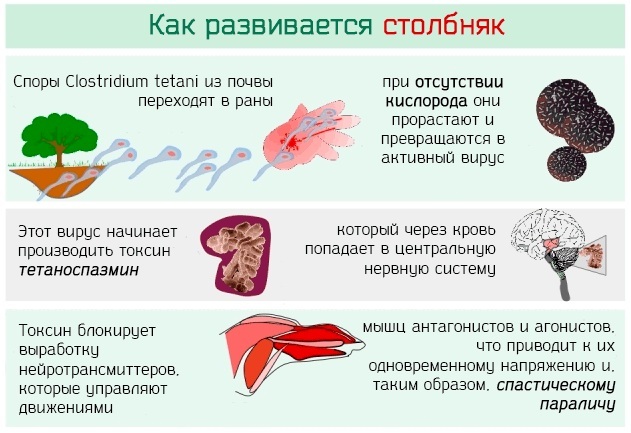
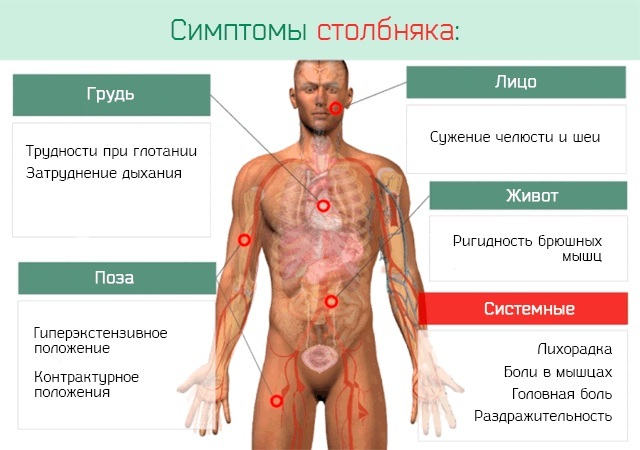
At the same time, mortality with the development of pathology ranges from 15 to 30%.
Why is tetanus shot required?
Vaccination is considered compulsory as the disease causes numerous disorders and is ultimately fatal. In this case, drug treatment is ineffective.
Contraindications
The drug is not used in the presence of pregnancy (in the first half), as well as during exacerbation of chronic diseases. Vaccination is also not carried out in the 1st month after the transferred infectious diseases and in the presence of immunodeficiency.
Types of vaccines
There are several main types of vaccines. This or that type of injection is selected according to the form of the infectious process.
Combined
This type of vaccine includes several anatoxic components and is used as a prophylactic agent for several infectious diseases at once. Moreover, such an injection has fewer side reactions.
Isolated
This vaccine contains only one toxoid (tetanus) component. An injection is used for revaccination of the adult population or for emergency immunization.
Emergency vaccination
Vaccination against tetanus (side effects in adults from taking the drug are extremely rare) can be both planned and emergency.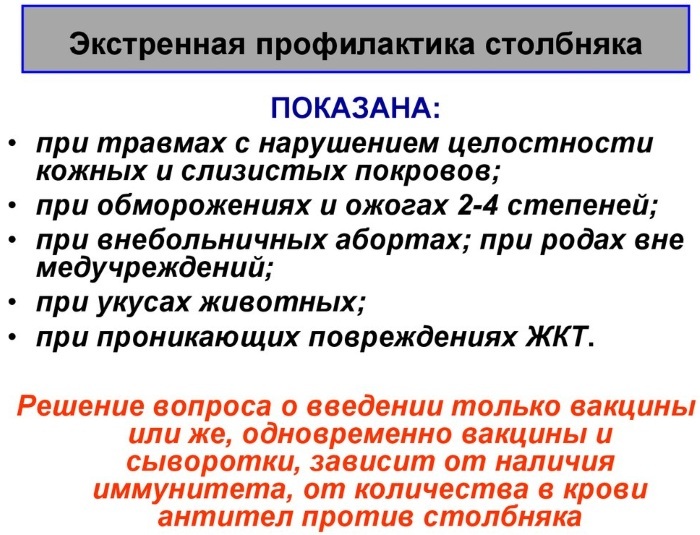
Emergency immunization is carried out at high risks of infection. In this case, vaccination must be carried out no later than the 20th day after injury.
If necessary, an immunological test is prescribed to determine the concentration of antibodies in the blood.
Such immunization can be carried out even in a state of alcoholic intoxication.
Routine immunization of children
Vaccinations in childhood are carried out according to a specific schedule established by the Ministry of Health. In this case, it is recommended to follow the established schedule in order to avoid the accidental development of an infectious disease.
Terms of carrying out and actions of vaccination and revaccination
The first vaccine is given to a child at 3 months. The next vaccination is carried out at 4.5 months. The third time immunization is carried out when the child reaches six months.
Revaccination:
- The first one is 1.5 years old.
- The second is at 6 or 7 years old.
- The third and last - at the age of 14.
Further immunization is carried out every 10 years.
Where is the immunization done?
Children can be routinely vaccinated against tetanus at any medical facility, including the local clinic.
You can also go through the procedure in a private clinic or in a feldsher-obstetric station (FAP).
Features of preparation
The child should be examined by the attending specialist (pediatrician) before the vaccination is given. In this case, additional studies are carried out, excluding or confirming the presence of contraindications.
A biochemical or general blood test is also carried out, which will determine the presence of antibodies to infection. In some cases, medications belonging to the group of antihistamines may be prescribed.
Where is the injection done?
Tetanus vaccination (side effects in adults can occur in a complicated form) is administered intramuscularly in the front of the thigh.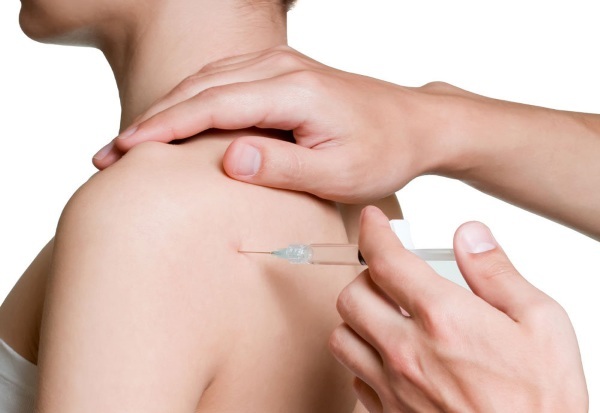 For children from 6 years old, the vaccine is placed in the shoulder area or under the shoulder blade.
For children from 6 years old, the vaccine is placed in the shoulder area or under the shoulder blade.
What should not be done after vaccination?
The first half hour after the procedure, it is necessary to observe a specialist in order to avoid the development of allergic reactions.
Parents are also advised to follow certain rules:
- Refuse to introduce new foods into the child's diet.
- Eliminate the use of potentially allergenic foods - citrus fruits.
- Avoid getting water at the injection site, refuse water procedures.
- Eliminate any attempts to touch or scratch the injection site.
- Do not apply various creams or ointments at the sites of vaccination.
- Monitor the child's temperature readings.
It is necessary to follow these recommendations within 1-2 weeks after the immunization.
Immunization of adults
Tetanus vaccination in adulthood follows a different schedule than childhood immunization.
Terms of carrying out and actions of vaccination and revaccination
Routine immunization of the adult population is carried out every 10 years.
In the absence of vaccination in childhood, the first injection is given to an adult patient. After a month, a second injection is performed. A year later, the injection is given for the third time. In the future, revaccination is carried out according to the standard scheme - 1 time every 10 years.
A high immune response to an infectious disease is observed during the first 5 years. In the future, the effectiveness of the vaccine gradually decreases. In severe or urgent cases, revaccination can be carried out earlier than the specified period.
Vaccination and pregnancy
Immunization while carrying a child is allowed only in the 3rd trimester, not earlier than from the 27th week of pregnancy.
No negative effect on the formation of the fetus or the condition of the mother was revealed when using the drug.
Where is the immunization done?
The injection is given in any medical institution, including a polyclinic located at the place of residence.
Features of preparation
Before the injection, it is necessary to undergo laboratory blood tests to detect antibodies to the disease. It is also recommended to refrain from drinking alcoholic beverages and medications a few days before the injection.
Where is the injection done?
A tetanus shot (side effects in adults can provoke a complicated immune response) is placed on the outer thigh. In some cases, the injection is performed in the shoulder area.
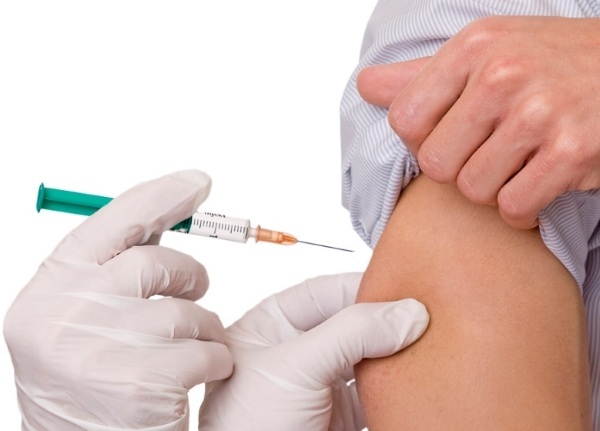
Vaccination is not given in the buttocks area.
What should not be done after vaccination?
To avoid the development of negative reactions, it is necessary to follow some rules after the injection.
Recommendations:
- Exclude the use of alcoholic beverages within 3 days after injection.
- Avoid getting moisture on the vaccination area, refrain from visiting baths, saunas or any other water procedures.
- Refuse heavy physical exertion.
If the rules are followed, the risks of developing negative manifestations are minimized.
The body's normal response to the vaccine
After the immunization in the first few days, some reactions may develop, indicating the effect of the drug.
Effects:
- general malaise of the body;
- slight increase in body temperature;
- the development of headaches;
- reactions in the area of the injection - redness, itching, soreness;
- fatigue, lethargy, drowsiness;
- excessive activity;
- increased irritation.
These symptoms indicate a normal immune response of the body and, as a rule, go away on their own within a few days. In extreme cases, the use of antipyretic drugs is allowed.
Side effect in adults, children
In some cases, the use of tetanus vaccine can lead to side effects.
Temperature
In most cases, when negative reactions occur, the body temperature rises. The condition may be accompanied by chills or fever. In rare cases, the development of hyperthermia, muscle or joint pain is noted.
Headache
Against the background of vaccination, headaches of a short-term nature may develop.  The condition is not dangerous to human health and goes away on its own. The use of light analgesic drugs is allowed.
The condition is not dangerous to human health and goes away on its own. The use of light analgesic drugs is allowed.
Fatigue
Fatigue reactions often occur after the injection is given. This condition is associated with the response of the immune system to the vaccine.
At the same time, it is recommended to rest more and not to exercise excessive physical activity.
Possible consequences of vaccination
Tetanus vaccine given as an adult can rarely be serious or impaired. In this case, side effects can be both short-term and permanent.
Sealing the injection site
The formation of seals at the injection sites occurs due to the presence of aluminum hydroxide in the composition of the agent. This component allows the solution to penetrate slowly and dosed into the human blood. This is necessary for the development of strong immunity.
In some cases, the use of the drug leads to the formation of seals and redness in the injection area. The condition can be caused by the onset of inflammatory processes at the injection site. Also, such violations can occur with incorrect (shallow) administration of the drug.
In this case, no specific treatment or other preventive measures are required. With an increase in the volume of compaction and the presence of discharge, it is necessary to urgently consult a treating specialist.
When sealing places are formed, it is prohibited to use various medical and cosmetic products - ointments, creams, gels.
Edema
In some cases, edema may form at the injection sites. In this case, the condition may be accompanied by pain and redness. In rare cases, bleeding may occur.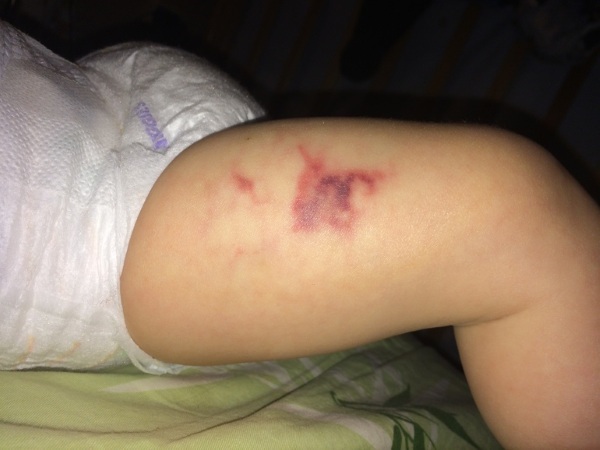
With the development of such processes, it is recommended to contact a treating specialist.
Nausea, vomiting, diarrhea
Similar symptoms occur in 3 out of 100 cases when using Tdap solution. In order to avoid the development of complications, it is necessary to consume a sufficient amount of liquid per day, and also follow the rules of nutrition.
The condition does not require medical treatment and in most cases goes away on its own.
Rash, swollen glands
Similar signs can occur on the action of an anatoxic substance. However, this reaction is not pathological and usually goes away on its own within a few days after using the drug.
Allergy
It is extremely rare that allergic reactions can develop with the tetanus vaccine.
The most common symptoms are:
- difficulty swallowing;
- breathing problems - shortness of breath, difficulty;
- itchy signs in the limb or throat area;
- rashes, urticaria;
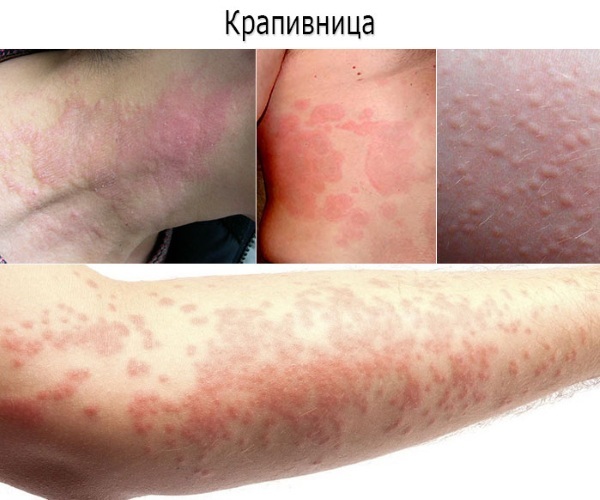
- the formation of puffiness in the face, throat - anaphylactic reactions.
Symptoms like these tend to develop within minutes or hours. With the development of these signs, it is recommended to immediately contact a treating specialist.
How to relieve the condition after vaccination?
Tetanus vaccination (side effects in adults in severe cases require drug treatment) can lead to a worsening of the patient's condition. Moreover, in some cases, symptomatic therapy is required, aimed at alleviating the patient's condition.
It is possible to alleviate the condition after using the injection solution both at home and with the help of medications.
Compress at the injection site
To eliminate negative reactions, various compresses based on anti-inflammatory ointments are used. The most suitable drug is Vishnevsky ointment. You can also use ichthyol ointment.
Liniment is applied with a small strip on gauze and applied to the injection site for 3 hours. Apply the remedy according to this scheme for several days.
Treatment regimen:
- Take 2 tbsp. pure medical alcohol or vodka.
- Dissolve 1 tablet of acetylsalicylic acid in alcohol.
- The injection area should be gently treated with sunflower oil.
- Moisten gauze or bandage in alcohol solution.
- Apply a compress to the injection site.
- Fix the bandage with tape or regular plaster and leave overnight.
This procedure must be repeated at least 2-3 times. During this time, pain and swelling should completely disappear.
Pain medications
Also, various medications with analgesic effects can be used.
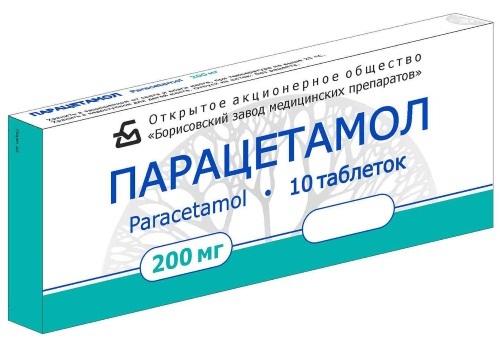
| Product name | Active substance | Features / characteristics | Price |
| Paracetamol | paracetamol | This drug has analgesic and antipyretic properties. The drug is produced in the form of tablets for oral administration. A medication is prescribed for pain syndrome and febrile conditions. Also, the remedy is indicated with an increase in body temperature. Contraindications to taking pills are hypersensitivity reactions, as well as children under 6 years of age. The dosage of the drug is calculated according to the age and body weight of the patient. The duration of treatment depends on the severity of the pathological process. | RUB 32-56 |
| Ibuprofen | ibuprofen | This medication is in the form of a tablet for oral use. The drug belongs to the class of non-steroidal anti-inflammatory drugs and is a derivative of the propionic acid component. The action of the components of the remedy is aimed at eliminating inflammatory processes and relieving pain. The drug is used for pain syndrome caused by the development of various pathological processes. Before using the medication, it is necessary to consult with the attending specialist, since the tablets have an extensive list of contraindications. The daily dosage and other features of the use of tablets are calculated according to the pathological process and the patient's age. | RUB 41-154 |
| Acetylsalicylic acid (aspirin) | acetylsalicylic acid | This pharmaceutical agent is produced in the form of tablets for oral administration. This drug is a representative of the non-steroidal anti-inflammatory group of drugs. Indications for taking pills are pain caused by the development of various diseases, as well as an increase in body temperature. Restrictions on the use of the medication are the following diseases and conditions: bronchial asthma, hemorrhagic form of diathesis, the presence of erosions and ulcers in the gastrointestinal tract, as well as the 1st and 3rd trimester pregnancy. The daily dosage is 0.5 to 1 g. The break between doses should be at least 4 hours. The duration of treatment should not exceed 7 days. | RUB 210-365 |
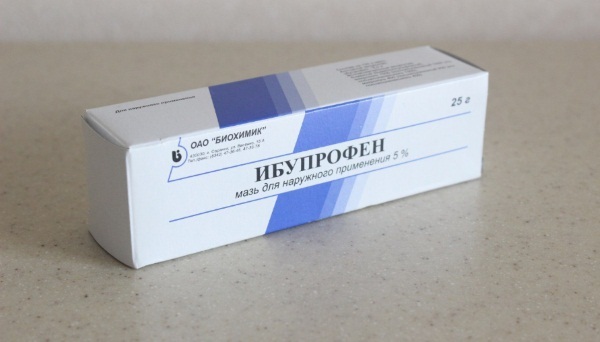
Before using medicinal products, you must carefully read the instructions for use and consult with your doctor.
Adult tetanus vaccination should only be given after consultation with a specialist, since there are high risks of developing side effects associated with physiological characteristics the patient.
Video about tetanus vaccination
Temperature after DPT vaccine:



